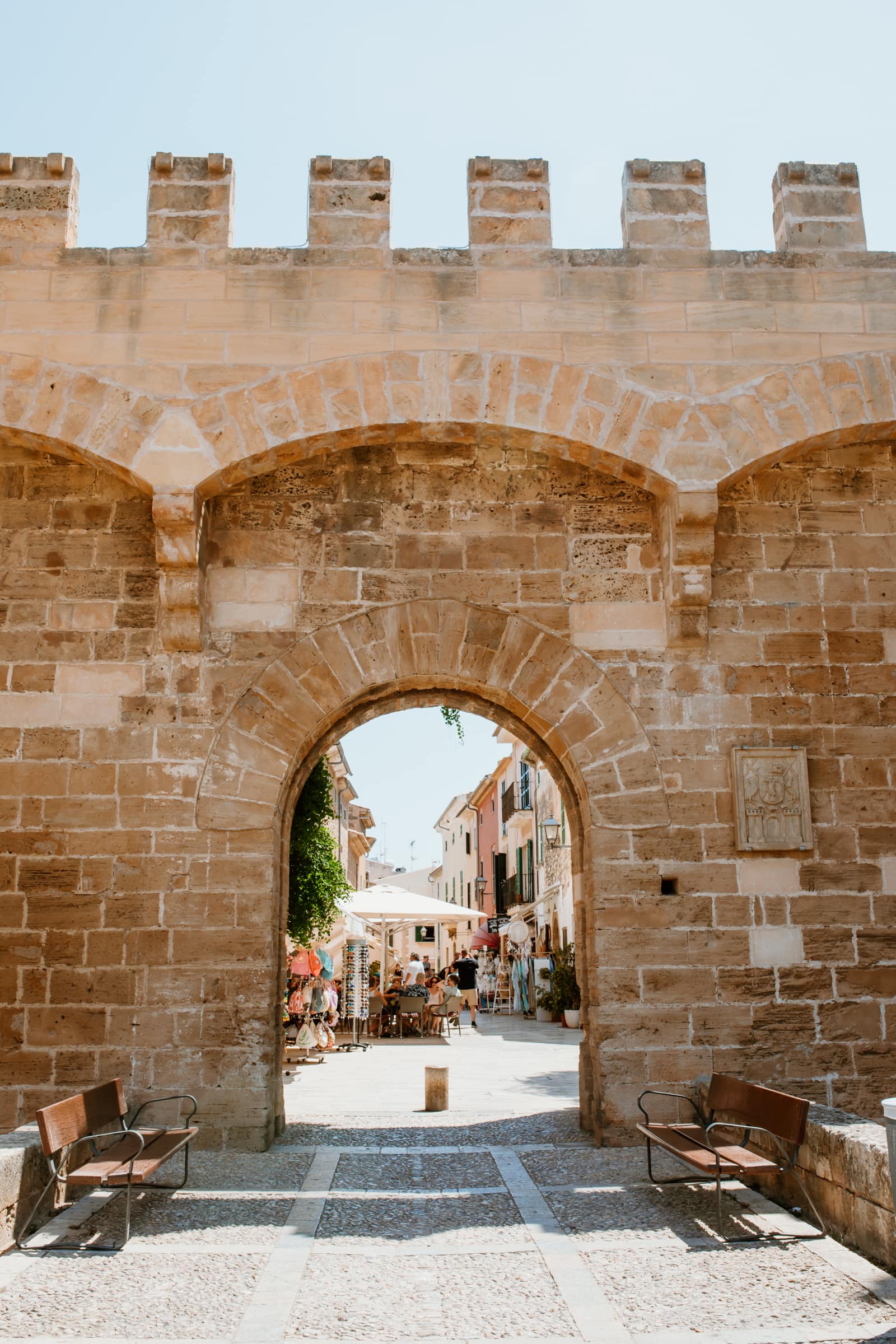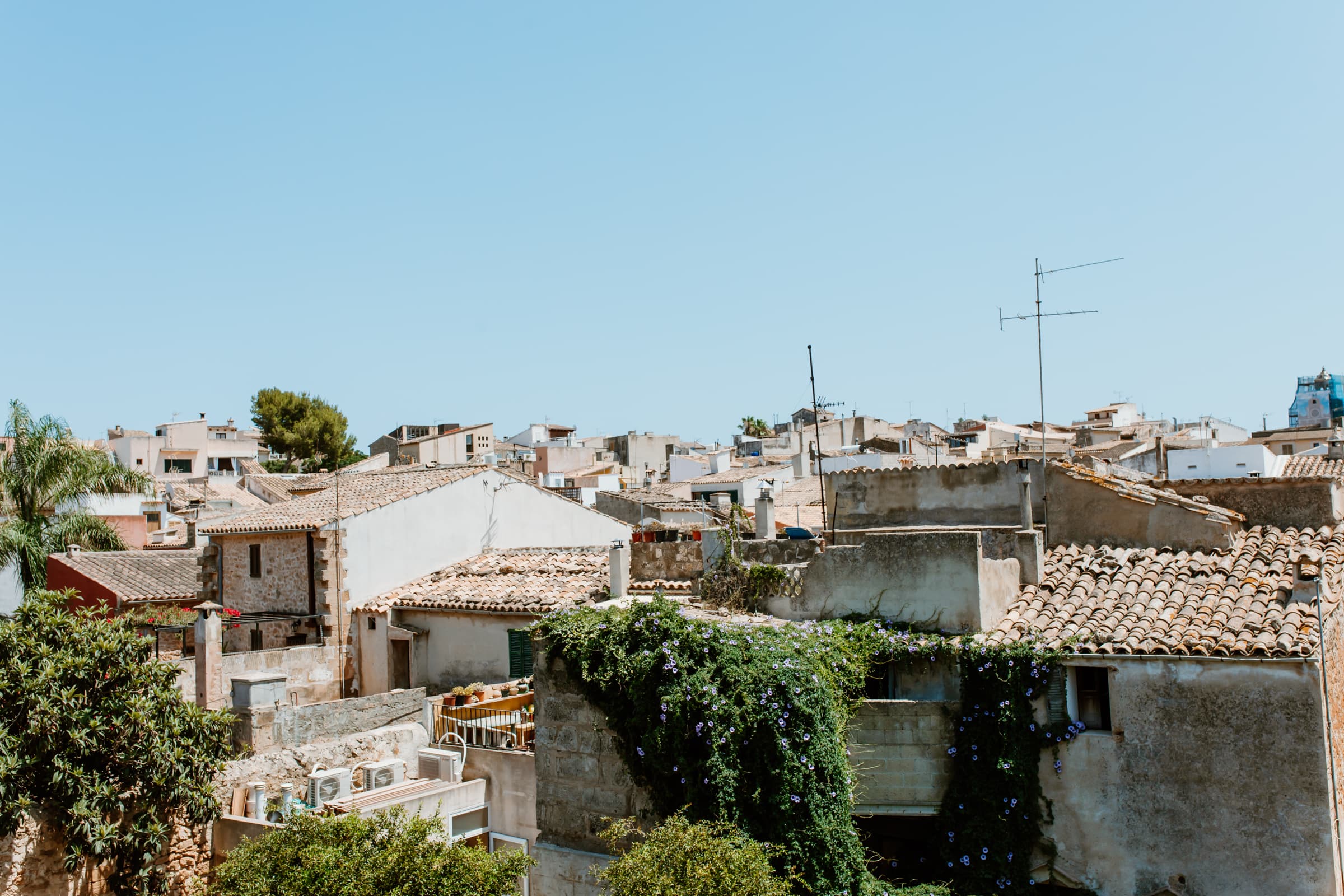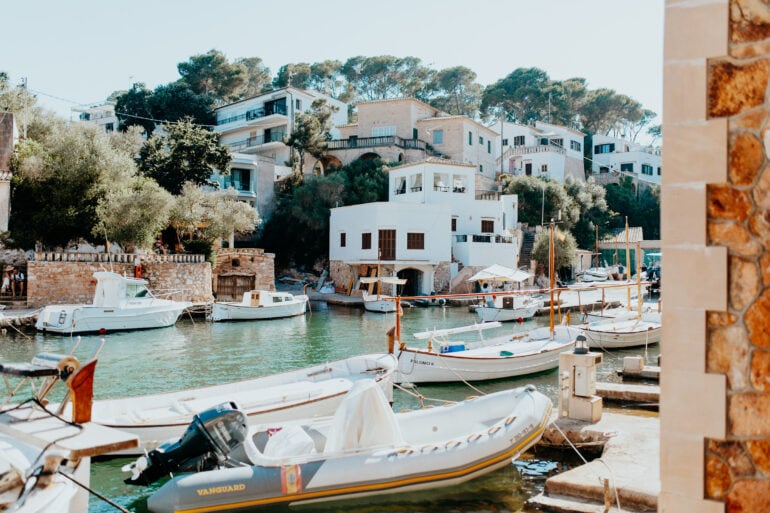Alcúdia is located in the north of Mallorca and is the oldest town on the island: come with me on a tour of the old town, which is well worth seeing.
Alcúdia is located in the north of Mallorca and as the oldest town on the island, it’s bursting with history. But even if you’re not a history buff, you’ll love it here: The small old town of Alcúdia is just too pretty!
What you need to do:
➜ Be sure to take a walk along the city wall
➜ People-watching at Plaça de la Constitució
➜ Visit one of Mallorca’s largest markets
➜ Enjoy art & culture, such as the Roman excavations or the Museo Sa Bassa Blanca just outside the city

1. Porta de Sant Sebastià
The old city wall makes the old town of Alcúdia so unique. Two large gates are still preserved; one of them is the Porta de Sant Sebastià, also called Puerta de Mallorca. Once through, you’ll find yourself almost in the middle of the hustle and bustle of the small old town.


2. Alcúdia Old Town
The Old Town is not particularly large, but it’s maintained and well preserved. The narrow main streets are lined with small stores and bars. For the most part, the Old Town is a pedestrian zone.
Hey, I’m Tatiana and I’m the blogger behind The Happy Jetlagger. Since 2014, I’ve been sharing my personal travel stories on this blog. I don’t have a big team behind me, so I’m pretty much a one-person show: All recommendations are fully researched by just me!


Mainly, the stores here have adapted to the huge amount of tourists in summer and are selling mainly souvenirs. Still, I think the selection here is more appealing than elsewhere, so if you’re looking for tasteful souvenirs, you’ll definitely find them here!
Find more tips for the island here:
All about Mallorca

3. Plaça de la Constitució
Plaça de la Constitució is the central location in the Old Town. The small spot is lined with numerous cafes and restaurants: perfect for a little break during a sightseeing day. However, most of the places here are real tourist traps and I would only stop here for drinks at most.

In the side streets you will find a few small pubs away from the crowds, where you can also enjoy the atmosphere. For coffee, cake and snacks, I’ll recommend Süss, a small café and pastry shop. The coffee is great and the bocadillos are delicious!





Advertising / *affiliate link
4. Porta del Moll
Once you’ve crossed the old town from the Porta de San Sebastian, you’ll eventually end up at Alcúdia’s second major city gate. The Porta del Moll is also called Puerta de Xara and is a popular meeting place in the old town!

5. Alcúdia Market
The Paseo Mare de Déu de la Victòria runs towards the Porta del Moll: this is where the Alcúdia market is held twice a week. Every Tuesday and Sunday, you can stroll along the Paseo and buy just about anything from vegetables, cheese, groceries, clothes and souvenirs. The market of Alcúdia is one of the largest on the island!

Read this articles for a full list of all markets on Mallorca:
Tip: Are you traveling on the island without a car and want to visit Alcúdia? On this tour you can get to know Alcúdia on a market day and afterwards, you’ll visit Cape Formentor (an absolute must-see!):
Tour to the market of Alcúdia and Formentor* (boat trip included!)
6. City Wall of Alcúdia
In Alcúdia you should definitely climb up the city wall! It dates back to the 14th century and is still really well preserved. From here, you’ll have a great view of the roofs of the old town and you can also see the Serra Tramuntana on the other side. You can’t get all around the Old Town, but near the Porta de Sant Sebastià there are a few open staircasem where you can climb up!

7. The Roman Excavations
The history of Alcúdia actually goes back over 4000 years. This makes Alcúdia the oldest town in Mallorca! Archaeological finds suggest that there were already Talaiotic settlements on the site of today’s Alcúdia. Phoenicians and Greeks then landed here until the Balearic Islands were conquered by the Romans in 123 BC. The Romans called their settlement “Pollentia”, which became the capital of Mallorca and the province of the Balearic Islands.

The ruins of Roman Pollentia can be visited today in Alcúdia; the excavation can be reached on foot from the Porta de Sant Sebastià. There you can see the remains of the theater, the forum and a residential area. I’m not much of an archaeology nerd myself and never went to see the digs, but maybe it’s something for you – feel free to report back in the comments if you’ve been there!
With the ticket of the excavation site you also free entrance into the museum nearby.
However, the Roman Pollentia was robbed and destroyed by the Vandals in the 5th century; so a few kilometers away a new settlement was built, today’s Pollença.

With the arrival of the Moors and Arabs in the 10th century, Alcúdia finally got its present name, derived from the arabic word “Al-Qudya” (the hill).
Then, at the end of the 13th century, the construction of the city wall was begun to protect Alcúdia from the many pirate raids. Unfortunately, this wasn’t successful, and several epidemics caused the population to decline even further. In 1779 the harbor Port d’Alcúdia was built, but Alcúdia gained real importance only in the last century with the construction of an important power plant (today no longer in operation) and the general boom of the tourism industry on the island.


Want to explore Mallorca? Then you’ll need a rental car!
Book your rental car for Mallorca here*
8. Playa de Alcúdia & Playa de Muro
Alcúdia is blessed with some of the most beautiful stretches of beaches on the island. The sea here is wide and open in many places. Especially among kite- and windsurfers, the north of Mallorca is very popular. But the flat sloping beaches are also a dream for families with children .

Playa de Alcúdia Centrally located, yet a very nice beach and popular with families
Playa de Muro Super long, white sandy beach, definitely worth a trip! The jetty, which extends far into the sea, is a popular photo spot!
Playa de Alcanada Less touristy. Mainly located under pine trees and with a rather rocky entrance to the water, Playa de Alcanada is a popular beach for extensive picnics, especially among locals!
Advertising / *affiliate link
9. Port d’Alcúdia
The port of Alcúdia is rather touristy. On the long beach promenade there are numerous cafes and restaurants, but also some stores – even a Mango branch can be found here.
By the way, from the port you can make many boat trips, for example to Formentor* or to Coll Baix*. The ferry to Menorca also departs from Alcúdia – in just 75 minutes you’ll be at the port of Ciutadella for a day of sightseeing.
Tickets for the ferry to Menorca*


10. La Victória Peninsula
If you are already in the area, I also recommend a side trip to the Ermita de la Victoria. The former hermitage is a popular destination for excursions. Here you can also go hiking or visit somewhat rougher beaches such as Playa S’Illot.

You can also find pure nature in the Albufera National Park.
If you are interested in art, the Museo Sa Bassa Blanca is certainly something for you. The private museum is located in the middle of the peninsula La Victória and is a real insider tip! Get your ticket here*

Where to stay in Alcúdia
Especially along Alcúdia’s beaches in Las Gaviotas and Ciudad Blanca, you’ll find one big hotel after another. However, it is not quite as overbuilt here as at other tourist areas.
If you’re looking for something special, you’re more likely to find it in the old town of Alcúdia, which now boasts with some great places:
If you like it more secluded, but still close to the beach, this accommodation near the Ermita might be something for you:
What is the best way to get to Alcúdia?
Although located far in the north of the island, Alcúdia is very easy to reach by public transport. There are even two bus connections to Palma:
Bus line 302 to Estació Intermodal/Plaza España
The trip takes about an hour, depending on whether you want to go to the old town or to the more distant beaches.





